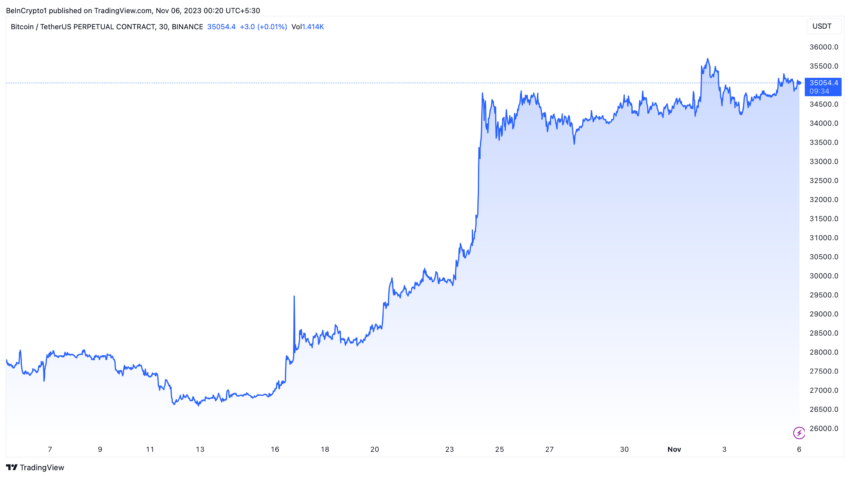The One Thing That Could Kill Bitcoin

[ad_1]
As Bitcoin continues to thrive, reaching new yearly heights and gaining mainstream adoption, Arthur Hayes, the former CEO of BitMEX, voiced a concern that could potentially throttle Bitcoin’s defining essence.
Hayes’ discourse sheds light on a scenario where the institutional custody of Bitcoin could morph it from a tool of financial freedom to an institutionalized asset, thereby derailing its original promise.
Institutional Interest: The Real Bitcoin Killer
Bitcoin’s ethos since inception has been decentralization, a financial system that operates sans any centralized authority. It stands in stark contrast to traditional financial systems, which Hayes described as statist money “that is here for us, the people.” However, the encroaching institutional interest, especially the potential approval of spot Bitcoin ETFs (exchange-traded funds), could be a double-edged sword.
Hayes, in a recent conversation, laid out a rather grim scenario. He speculated about the potential repercussions if traditional finance magnates like BlackRock CEO Larry Fink and his ilk decide to scoop up a large portion of the freely circulated Bitcoin. This action could transition Bitcoin from being a financial freedom tool to just another asset under institutional control.
The core of the concern lies with how these institutional behemoths could potentially control Bitcoin, changing its fundamental use case. Hayes pointed out that if entities like BlackRock and Fidelity enter the fray by launching Bitcoin mining ETFs, it would be akin to them becoming “agents of the state,” a stark contradiction to what Bitcoin stands for.
Read more: What Is Bitcoin? A Guide to the Original Cryptocurrency
In Hayes’ view, the state’s agenda to keep citizens within the fiat banking system for taxation purposes could find a new ally in these institutional entities. If these institutions hoard Bitcoin in ETF vehicles, the very essence of Bitcoin – being a decentralized, usable currency – is lost.
“You can’t actually use the Bitcoin. It’s a financial asset. It’s not the actual Bitcoin itself,” Hayes explained in such a scenario.
Further, Hayes warned that if an entity like BlackRock’s ETF grows too substantial, it could “kill Bitcoin.” The hoarded Bitcoin would become a stagnant asset rather than a circulating currency. This, he argued, is trading “a sugar high today for calamity tomorrow.”
Still, Institutional Capital Will Fuel the Bull Run
The crux of Hayes’ argument is that Bitcoin’s core strength lies in its decentralized nature. It enables financial inclusivity and freedom. However, institutional adoption, especially the potential approval of spot Bitcoin ETFs, may be a precursor to Bitcoin losing its essence.
Conversely, the influx of institutional interest undeniably brings a bullish sentiment in the crypto market. Rachel Lin, CEO of DEX SynFuture, believes Bitcoin could soar to nearly $50,000 by the end of the month, given historical trends.
“Last week has cemented October’s reputation as ‘Uptober,’ with Bitcoin witnessing nearly a 29% increase in value. Even more interesting is that when we look at historical data, November tends to be even better than October, with an average return of over 35% in Bitcoin. If this November were to deliver similar returns, we could see BTC reach around $47,000,” Lin said.
Read more: Why a Bitcoin ETF Approval Could Ignite the Biggest Bull Run in Crypto History

Options data also reveals a bullish market sentiment. Large bets are being placed, anticipating Bitcoin to reach higher values in the near future. This reflects a broader optimism in Bitcoin’s potential for growth, fueled further by institutional interest.
“As of today, the top two options with the largest open interest are the 40,000 December call and the 45,000 December call. Even the 50,000 December call option has over 5,000 bitcoin open interest. This suggests a large number of people are willing to bet that bitcoin will be significantly higher in two months than what it is today,” Lin added.
In the euphoria of potential financial gains, a looming question remains. Could the institutions propelling Bitcoin’s price be the same entities that could strip it of its soul? The scenario painted by Hayes calls for investors to ponder the long-term implications of institutional interest in Bitcoin.
Disclaimer
In adherence to the Trust Project guidelines, BeInCrypto is committed to unbiased, transparent reporting. This news article aims to provide accurate, timely information. However, readers are advised to verify facts independently and consult with a professional before making any decisions based on this content.
[ad_2]
Source link









